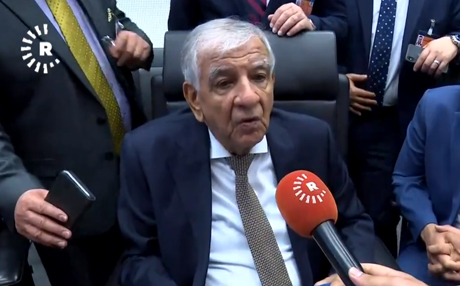"We have started to receive the Kirkuk oil to Iran. I hope to be able to continue it as the program we have agreed to with the oil ministry of Iraq," Iranian Minister Bijan Namdar Zangeneh told Rudaw on Friday.
Iran, a founding member of OPEC in 1960 in Baghdad, was attending a conference in Vienna, Austria, along with the organization's 11 other members.
"But for continuation of this swap, and to we need to increase the level of this swap, we need to build a pipeline between Kirkuk and Iran," emphasized Zangeneh. "Currently it's at 30,000 bpd, could be increased it to more than 300."
Iraq's State Organization for Marketing of Oil (SOMO) currently sends Kirkuk oil by tanker truck to a refinery in Kermanshah. In return, Iran sends the same amount of oil to southern Iraq.
The city of Kirkuk came under federal control on October 16, 2017. It was previously under the control of Kurdistan's Peshmerga forces. The Kurdistan Regional Government had used a pipeline to independently export oil to the port of Ceyhan in Turkey, where it was bound for world markets.

Jabbar al-Luaibi, Iraq's oil minister, speaks to Rudaw at the OPEC conference in Vienna, Austria, on June 22, 2018.
Iraqi Oil Minister Jabbar al-Luaibi reiterated to Rudaw at OPEC that talks are underway between all players to re-open the Ceyhan pipeline.
"The pipeline is owned by Rosneft, BP, and a Kurdistan Region company. Now we are in talks with them and God willing this issue will be resolved. Talks with Rosneft, BP and the Kurdish company are ongoing," Luaibi said.
BP had tried to operate in Kirkuk in 2003, but stopped after the KRG said operations must be done in coordination with Erbil given the legal status of the province.
The Kurdistan Regional Government and Iraqi government unsuccessfully have tried to negotiate the re-opening of the pipeline since the federal takeover.
The KRG complains that the seizure of oil fields by Baghdad in the disputed or Kurdistani areas has halved their revenues.




Comments
Rudaw moderates all comments submitted on our website. We welcome comments which are relevant to the article and encourage further discussion about the issues that matter to you. We also welcome constructive criticism about Rudaw.
To be approved for publication, however, your comments must meet our community guidelines.
We will not tolerate the following: profanity, threats, personal attacks, vulgarity, abuse (such as sexism, racism, homophobia or xenophobia), or commercial or personal promotion.
Comments that do not meet our guidelines will be rejected. Comments are not edited – they are either approved or rejected.
Post a comment